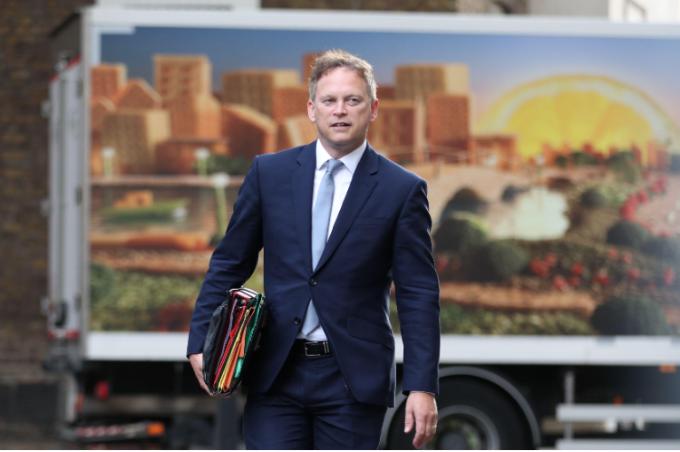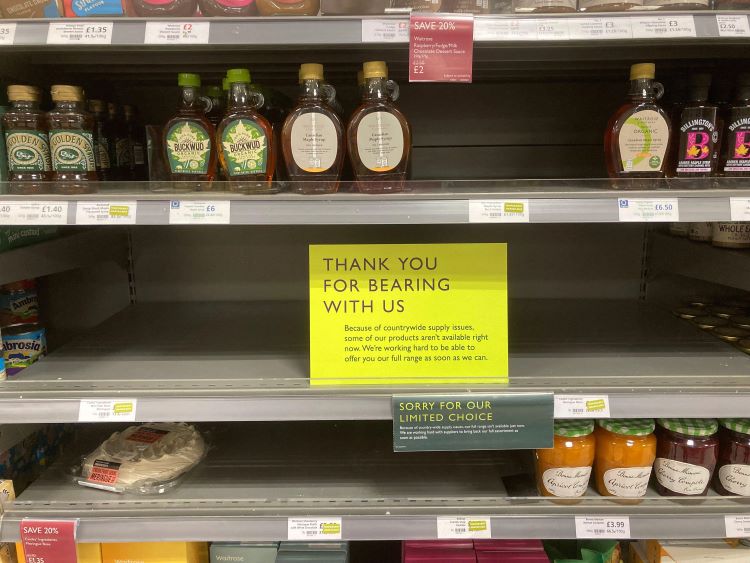Backlogs At UK Ports Could Last Well Into Next Year And Ruin Choice In Shops
5 min read
Chaos caused by severe blockages at Felixstowe Port last week may have begun to subside slightly, but industry figures are warning that delayed shipments and reduced consumer choice could still last well into next year.
Container ships packed with items including furniture, toys, electronic and white goods being turned away from the UK's largest commercial port were the latest supply chain crisis to make headlines, triggering yet more warnings of shortages this autumn.
“Further disruption may be unavoidable," Andrew Opie, the British Retail Consortium’s Director of Food & Sustainability told PoliticsHome.
The port of Felixstowe, which handles 36% of the country's freight container traffic, is dealing with a big backlog of ships unable to deliver cargo. It is a result of thousands of containers waiting much longer than usual before being moved along the supply chain because there aren’t enough lorry drivers to pick up the goods.
Around the world, long-standing shipping delays have been compounded by labour shortages, primarily those of HGV drivers. Last week Danish freight company Maersk, the world's largest shipping container company, was forced to temporarily reroute cargo headed for Felixstowe to ports elsewhere in Europe.
The head of one of the UK's biggest toy companies, The Entertainer, expects shortages of Barbie dolls and Paw Patrol toys this festive period due to blockages at Felixstowe. Ikea confirmed to PoliticsHome that the furniture chain had struggled to return containers to the port as shipping has slowed down.
Both the Department for Transport (DfT) and Felixstowe Port said the situation had improved in the second half of last week, with more space gradually becoming available for shipping containers. Government sources also stressed that seasonal fluctuation in port capacity is normal, and pointed to 24 hour operation of Los Angeles Port in order to clear its own enormous backlog.
But the problems seen in Felixstowe are one part of a much wider challenge facing the country's supply chains, with effects that will persist for a long time, industry figures are warning.

A source who is familiar with operations at Felixstowe said the disruption has been particularly acute since July and was likely to continue for several months.
Duncan Buchanan of the Road Haulage Association on Monday told the Business, Energy and Industrial Strategy Select Committee that it would take at least another twelve months for supply chains to recover, while in an even more dire warning the Food & Drink Federation's Ian Wright told MPs "every single" business he knows expected the crunch to last into 2023 and 2024.
Logistics UK's Alex Veitch told PoliticsHome his trade body expected to see a "serious issue" with supply chains for as long as the UK has a major shortfall of HGV drivers.
In a further sign that the strain on the UK's intricate supply chains would not be short-lived, Amazon believes disruption will continue until at least spring next year and is advising British customers to order Christmas presents four weeks early, The Independent reported on Friday.
Shadow Transport Secretary Jim McMahon last week wrote to Transport Secretary Grant Shapps asking him to spell out how the government intended to tackle delays at Felixstowe and other ports as the busy Christmas shopping period looms.
In a letter shared with PoliticsHome, McMahon cited warnings from Maersk that delays would force retailers to prioritise certain goods making it to UK shelves, resulting in shortages of others.
"To this end, how will you ensure that a second Christmas is not ruined for the nation? That Christmas toys, food and supplies do get into the country to meet demand?" he wrote.
Labour has also accused the government of not taking the issues facing freight seriously enough, with McMahon asking why the DfT-led Freight Council didn't appear to have met since June.
A government source insisted to PoliticsHome that the group met last month but the minutes had not yet been uploaded online. They added that the council "is not designed to be the main portal with industry" and that ministers were talking to stakeholders on a regular basis.

Nevertheless, a picture of a fundamentally altered British economy — one of reduced choice, higher prices, and supply chains not flowing as freely as they once did — is emerging.
Ranjit Singh Boparan, whose companies Bernard Matthews and 2 Sisters Food Group form the UK's largest chicken supplier, last week declared the UK was entering an era of higher prices due to labour shortages and higher production costs. He expects poultry prices to rise by over 10%.
"The days when you could feed a family of four with a £3 chicken are coming to an end," he said.
"We need transparent, honest pricing. This is a reset and we need to spell out what this will mean."
Wright, the Food & Drink Federation's CEO, predicted last month that food shortages which have started to appear in supermarkets across the country this summer would be permanent.
The just-in-time supply chain that, for decades meant consumers could expect a full range of products, "is no longer working," he said, "and I don't think it will work again".
Boris Johnson might be determined to ensure supply chain disruption does not ruin Christmas, but the issues facing supplies of festive food and gifts are set to continue beyond 25 December.
